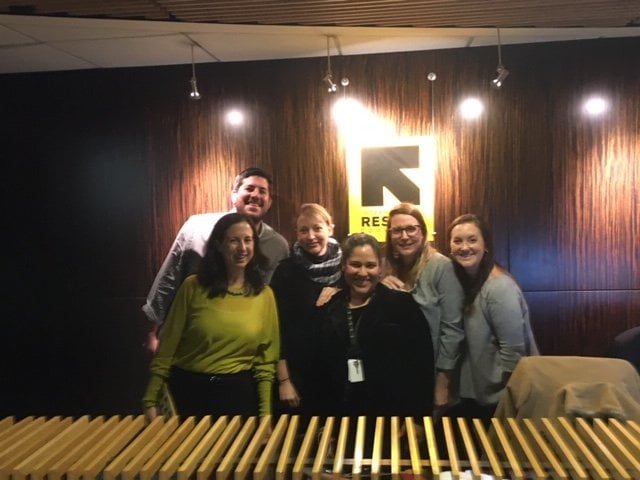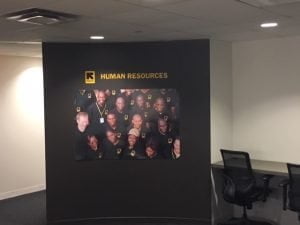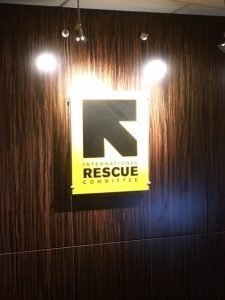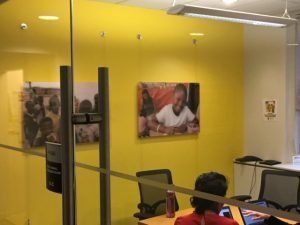Better Than Most is a regular feature of The Business of Giving, examining the best places to work among social good businesses and nonprofit organizations.
Denver: And for this edition of Better Than Most, we’ll be visiting the New York offices of IRC, the International Rescue Committee. They respond to the world’s worst humanitarian crises and help people survive and rebuild their lives. And to do this effectively, you need to have a great workplace culture, which as you will hear, IRC most certainly does.
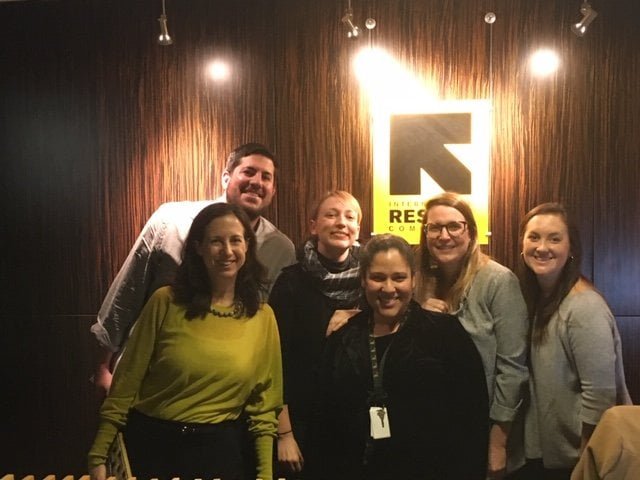
Matt Amaral: I do get a strong sense of camaraderie from anyone that I talk to. If we’re dealing with different issues that have nothing to do with my department or their department, the one thing that sort of binds us together is on some level, we are committed to the mission and feel strongly about it. Whether it’s someone that has been in the humanitarian sector their whole career, or someone that just jumped from the private sector, people are excited and motivated to work on our mission.
Stephen Smith: As somebody who sits behind a desk in New York City all day, it would be easy to not have a window into that. But because there are constantly presentations and lunches and forums and weekly posts on our intranet– highlighting initiatives or new staff members, and things like that– I think there’s a lot… it’s very easy to see the end result of our work and the people whose lives we improve, even for those of us who don’t work directly with those people. They make it quite easy to stay connected to the mission, and there’s ample opportunity for you to learn more and engage in a huge variety of subjects topics.
Milagros Cruz: Besides looking off from my computer, I also love as far as favorite days… one of them is going to the graduation of the Refugee Summer Academy. I remember going to the program a few years ago when I knew about the program, but I had never visited the program, and I made the mistake of going without tissues. And I always said: “I am never going back there without tissues!” I remember listening to a young lady speak in Spanish, because that’s all she could speak at that time. The next year, when I went to graduation, she was one of the speakers at graduation. I am going to try not to cry… but she delivered this moving speech in English that you would have never thought it took her just a few months to learn. So really watching what we do as an organization, how much we care about rebuilding lives.
Autumn Brown: This year, we talked about New Year’s Intentions instead. I was just really impressed because I do think we have a culture with a sense of urgency around improvement. New Year’s Resolutions, people wouldn’t stop talking. You couldn’t get people to shut up about their resolutions because I think everyone, especially when it comes to their work, is really passionate about doing the absolute best they can. I think that comes from… for a lot of my colleagues, there is the lack of separation almost between who you are and what you do. And I think a lot of us have identities that are deeply entrenched into what we do, and it creates a very hard-working and passionate culture.
Megan O’Malley: I have a team that is across all of the regions, but I still feel that one of the most cutting- edge or future-oriented aspects of our work… I’m not directly involved with… but it is our Airbel Center. That’s the thing I probably talk about the most when I talk to outsiders about IRC, in terms of being a thoughtful organization– not just running programs as they’ve always been run– but always thinking about: How can we better run our programs? How can we do things differently? What are new ideas that can better serve refugees?
Barri Shorey: With that great brilliance comes great conflict and disagreements and passion as everyone has spoken about. So it comes up a lot. There are disagreements often we have as technical teams with our country programs – no try this, please. I’m seeing it from a different light, and they say, absolutely not. There’s no way we could do that. How would you ever… and because of the family and because of the fact that we take time to get to know each other, conflict is often managed by adjusting to someone’s personality. I know that the coordinator I work with in Germany, he doesn’t respond to emails on time all the time. So, I know that Skyping him is better instead of getting annoyed or I know that if I use this particular buzzword with him, I’m more likely to get a yes.
Paige Host: One thing that I think is so cool… I don’t know if it’s unique to IRC, but I’ve never heard of it in another organization or company. It’s called the TTA; it’s the Temporary Transfer Assignment. People can change teams for a short period of time– six to eight weeks, sometimes longer. It lets people dip their toes in different subsections of the organization, which I think is a really cool opportunity.
A colleague, she was working with the emergency unit, and she just ran over to Jordan for a couple of weeks and she’s still there. And she’s coming back in two weeks. It’s definitely mutually beneficial to the organization and the individual.
Megan O’Malley: And there’s been a tremendous uptick in terms of both formal in-person training, virtual training. One of my favorite ones is “building basics,” which was more of… it was pushed out and offered: What’s your idea? What do you need anywhere around the world, at any of our sites? What training? It could be Excel training, or it could be something a little less concrete. But it was… you can put a petition in for it and then get funding for that training program. And I think that was great because it wasn’t just: “Here’s what you need.” It was: “Tell us what you need!” and then funding that need. I think that’s essential because a lot of times training programs get offered, and it may be misdirected.
Mia Briones: I just wanted to speak to a couple of different points about diversity, and I’ll speak about my particular team and sector. In the fundraising field, I will just say that I’m Latina. I don’t often see many people of color working in fundraising. So, being on this team for four years, I have to say that I’ve been so proud and impressed by the efforts that my team has made to be aware of this, and to be very conscientious about expanding our team and really being thoughtful about wanting to bring people with all different types of backgrounds.
Autumn Brown: I started off as a Peace Corps volunteer. Even then to know, what I often see in those trying to enter the humanitarian aid world in entry-level positions is that it requires so much volunteer work and internships and things that in order to get your foot in the door, it requires a certain level of privilege. I speak of that as a privileged person who is able to go years in the Peace Corps without getting paid. Intern in expensive cities without getting paid, and I feel like that’s something for us to recognize and I think important also to understand that there are so many transferable skills you can get without necessarily coming in at the entry level in a very highly competitive environment where it requires you to have this certain level of privilege unfortunately and hopefully maybe start a conversation around how to help get more people in at the entry level who might not come from those types of backgrounds.
Milagros Cruz: We encourage each other every month by writing down “feel goods” that are anonymous. Once a month, we all pick out of this feel-goods box, and we distribute these notes. We all get these little notes that we get to put up by our computer, saying things like, “Thanks for being so positive!” Or, “Thanks so much for working on that project and having a good attitude!” And it’s really a way for us to keep encouraging each other.
Matt Amaral: She’s having these clusters she calls which she’s taking about five or six of us from both teams out to coffee, and I had mine yesterday. She was at that one with us, and her first thing was, what needs to be changed, what can I do about it? Please tell me. The first time I had been in a situation where I felt comfortable just airing out what I thought needed to be changed along with several other folks. I think in terms leadership, there is a very positive trend going on to in connection with the whole staff.
Stephen Smith: So while you are able to be flexible, and you’re given that room, this is a global organization that really is working all the time on issues that require round-the-clock work. So if there is a crisis or an emergency, or even just some red flag went up in your inbox, people are willing to jump online, over the holidays even, New Year’s Eve… and so on. People don’t resent that, and people don’t feel forced into it. People, at least as far as I can tell, do it because they recognize that it’s important.
Paige Host: Something that I really love about this job is also the word entrenched. Autumn used it. Being entrenched in the change and making a difference around the world. We are so far away from so many of our programs yet we are so close to some other ones. And a lot of our colleagues coming in from all around the world and being able to meet them, it just gives you an insight on what we’re doing everywhere. I think the passion is incredible. Everybody works their butt off. It’s really cool.
Barri Shorey: I talk to people all the time who are interested about working at IRC, and I think what you need more than anything else is grit. You got to be ready to work. You got to be ready to dig your heels in. You got to be ready to always not get credit for that work. You got to be ready to be a team player.
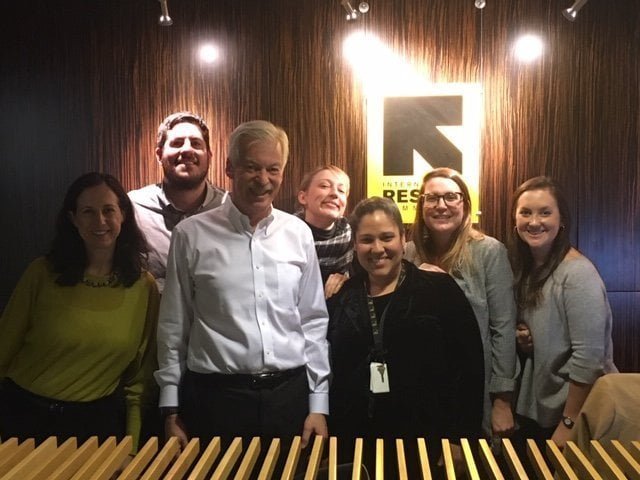
Denver: I want to thank all those who contributed to this piece: Matt Amaral, Milagros Cruz, Megan O’Malley, Barri Shorey, Stephen Smith, Autumn Brown, Mia Briones, and Paige Host.
To hear this again, read the transcript or see pictures of the participants and offices of the International Rescue Committee, simply come visit denver-frederick.com.
The Business of Giving can be heard every Sunday evening between 6:00 p.m. and 7:00 p.m. Eastern on AM 970 The Answer in New York and on iHeartRadio. You can follow us @bizofgive on Twitter, @bizofgive on Instagram and at http://www.facebook.com/BusinessOfGiving

